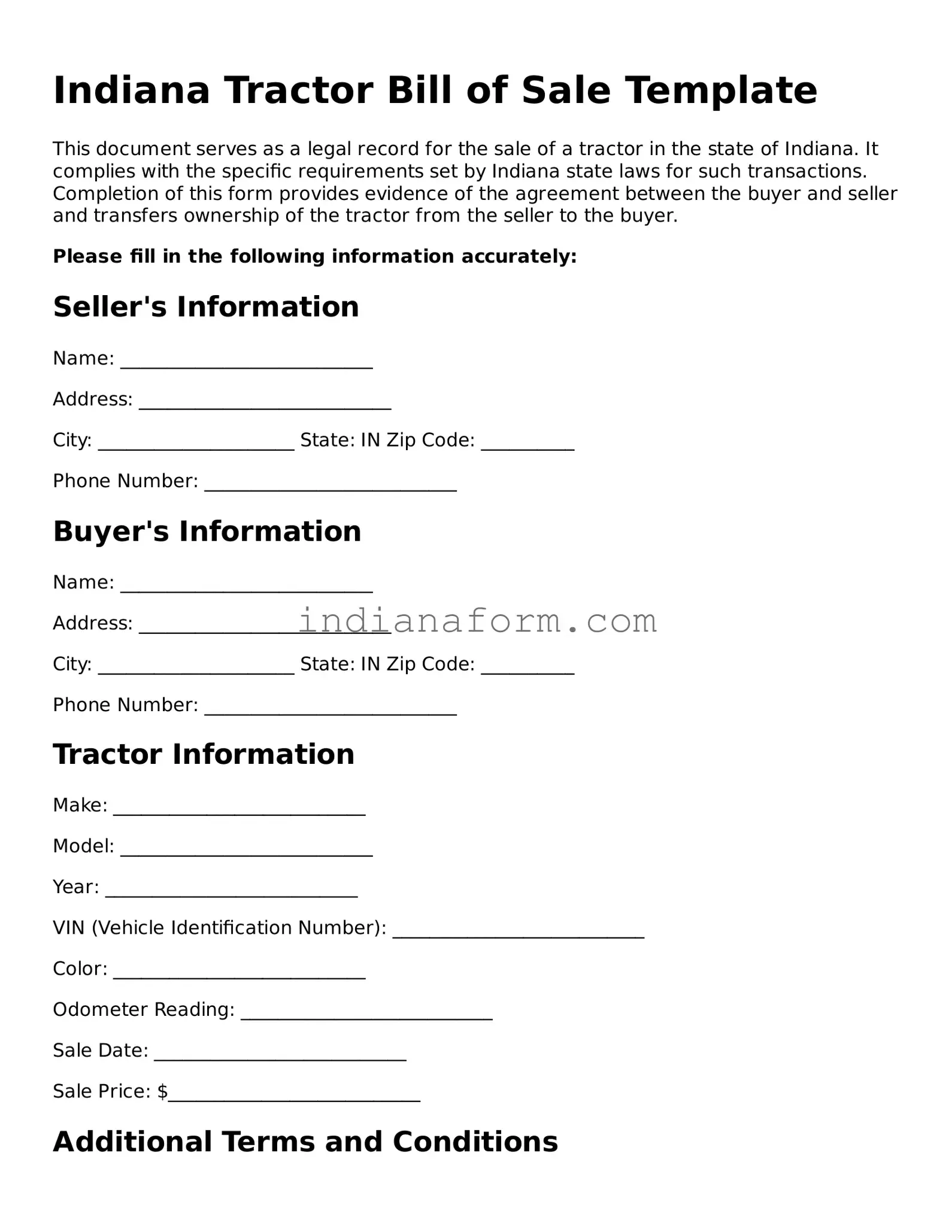What is a Tractor Bill of Sale form in Indiana?
This is a document that serves as proof of the transaction between a seller and a buyer for the sale of a tractor. It typically includes information such as the details of the tractor (make, model, year, serial number), the sale date, the purchase price, and the personal details of both parties involved.
Why do I need a Tractor Bill of Sale in Indiana?
Having a Tractor Bill of Sale is crucial as it legally documents the transfer of ownership. It protects both the seller and the buyer in case of future disputes. Additionally, it is often required for registration and tax purposes, especially when the tractor is used for agricultural business in Indiana.
What information should be included in a Tractor Bill of Sale?
A comprehensive Tractor Bill of Sale should contain the following details: the names and addresses of both the seller and the buyer, a detailed description of the tractor (including make, model, year, and serial number), the sale date, the sale amount, payment method, and any warranty information. Signatures of both parties are also necessary to validate the document.
Is notarization required for a Tractor Bill of Sale in Indiana?
While not always mandatory, having the Tractor Bill of Sale notarized can provide an additional layer of authenticity and may be beneficial in case of legal disputes. However, it's advisable to check the most current requirements in your locality as regulations can vary.
Can a Tractor Bill of Sale be used for tax deductions or exemptions in Indiana?
Yes, a Tractor Bill of Sale can be an essential document for tax purposes. It can help establish the sale's legitimacy and the ownership transfer, which might qualify for certain agricultural exemptions or deductions. It's recommended to consult with a tax professional regarding your specific situation.
How to ensure the validity of a Tractor Bill of Sale?
To ensure the Tractor Bill of Sale is valid, make sure it contains all necessary details, is signed by both parties, and, where possible, notarized. Also, verify the information against the tractor's official documents to avoid discrepancies.
What to do if any information changes after the Bill of Sale is completed?
If there are changes or errors in the information after the document is finalized, it's best to draft a new Bill of Sale that includes the correct details and have all parties sign it again. This helps maintain the accuracy and legality of the record.
Do both parties need to keep a copy of the Tractor Bill of Sale?
Yes, it is essential for both the seller and the buyer to keep a copy of the Tractor Bill of Sale. This serves as proof of purchase and ownership transfer and can be valuable in case of disputes or for record-keeping purposes.
How long should I keep my copy of the Tractor Bill of Sale in Indiana?
It's advisable to keep the Tractor Bill of Sale for as long as you own the tractor. In case of selling, transferring, or disposing of the tractor, the document should be kept for at least a few years after the transaction, to handle any potential legal or tax inquiries.
Where can I find a template for a Tractor Bill of Sale in Indiana?
Templates for a Tractor Bill of Sale can be found online through legal document platforms, at local offices that handle agricultural or vehicle registration, or by consulting with a legal professional. Ensure that the template complies with Indiana state requirements for it to be considered valid.

